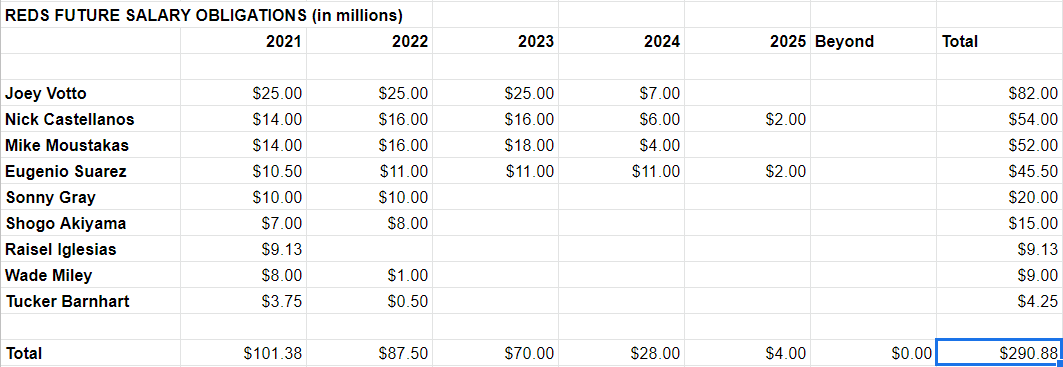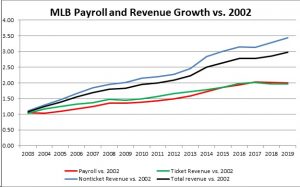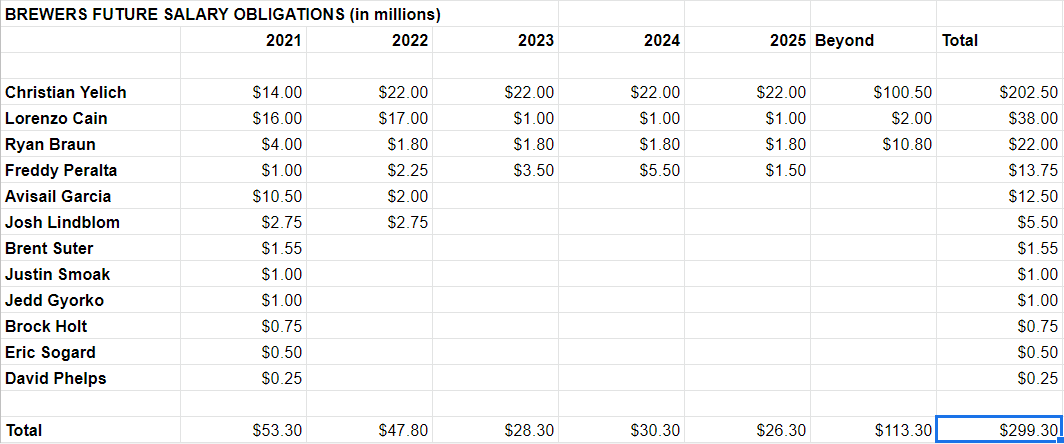Dr. Matt Swartz is a Labor Economist who has researched and published on MLB labor markets for over a decade at websites including The Hardball Times, FanGraphs, and Baseball Prospectus, as well as at MLB Trade Rumors. Matt created the arbitration salary projection model for MLB Trade Rumors, and co-created the SIERA pitching statistic available at FanGraphs. He has consulted for a Major League team since 2013, in addition to working in his day job as an economist in the cable industry. This article reflects his own opinion and not that of any of his employers or clients.
Previous posts: Resolving This Player-Owner Dispute Should Be Easy; MLB Collective Bargaining and Risk Sharing.
There is a way that players can get prorated salaries for a 72-game regular season and the owners can make enough money to only pay the equivalent of 68% of prorated salaries. We know the way that owners will agree to a deal with prorated salaries for 2020; they insist they need the revenue to make up for losses incurred during the regular season. While both owners and players have proposed expanded playoffs as a way to increase that revenue, they have been unable to create enough revenue for the owners to bite. I have a solution for this problem—start the playoffs earlier, add playoff teams, make the series longer, and reap the extra television revenue. There is more than enough there to get a deal done.
The biggest roadblock to completing a deal is the combination of the union’s insistence that players be paid on a prorated basis per regular season game, and the owners’ insistence that players take less than their prorated salaries due to absence of fans in the stands. Players have shown a willingness to extend the playoffs—effectively playing some games for free. Owners have shown some willingness to put on a 50-game shortened season with typical playoff structure, but have balked apparently at the risk of the players filing a grievance for not putting on as long a season as possible.
Eugene Freedman tweeted to me earlier in this series that the reason players were so insistent on prorated salaries is to avoid precedent. If this is true, the only way around this is finding more revenue sources—something the player proposals have hinted at, but not provided adequately to appease owners.
The owners have repeatedly centered on completing the regular season by September 27 and the World Series by the end of October, fearing that a second wave of COVID-19 in the fall could preclude the playoffs.
Fans have an additional concern that my proposal would resolve—they want to make sure that the World Series Champion deserves their title. A shortened season, combined with expanded playoffs, naturally increases the possibility that a mediocre team could walk away with the crown.
They could solve this by ending the regular season 10 days early to end on September 17, using doubleheaders and other ways to get to 72 games (or just shrinking the season further if the players are amenable). Then they would have 10 extra days to get in a lot more playoff games.
My proposal is that playoffs are expanded to 16 teams, but that all 15 series are Best-of-Seven series. On average, this will increase the expected number of nationally broadcast playoff games from 36 to 90 – a whopping increase of 150%. With $787 million reportedly at stake in television revenue for those 36 playoff games, it stands to reason that networks would pay at least half as much for the addition 54 games as the original 36, which brings in something like a whopping $590 million in extra revenue.
If players are content to simply get by on prorated salaries for 72 regular season games, they would receive about $1.84 billion in revenue. The owners’ extra playoff revenue places them in the equivalent position of 68% of prorated salaries. Marginal costs of operating these games are probably small enough to keep this only a couple percent higher. The owners almost certainly need the players to take a haircut smaller than 32%, so there is plenty of room for give in this approach. Even if networks were only willing to pay a third of the per-playoff-game rate, that would still be enough revenue to get owners to effectively pay the equivalent of 79% of prorated salaries. There is probably even room in there to give the players some playoff share, cover some marginal costs of games, and other things that could be required for this to be profitable to owners and acceptable to players.
As a result, the odds that an inferior team wins a given series are lower, and it becomes more likely that a deserving champion is crowned. The league could even take further advantage of the empty-stadium format by tilting home field advantage entirely towards the team with the superior regular season record.
I have researched home field advantage extensively, and have learned that rather than home crowd support or even last at-bats, the real reason home field advantage exists is that players are more familiar with their own parks. Teams who are home for a 7-game series will have a 59% chance of winning an evenly matched series already. A superior team certainly could easily have a 70% chance of winning a series in many cases.
This seems to be something that would accomplish the requisite situation for all parties, and there are many other ways that players could help teams add revenue without sacrificing their prorated salary demand. But the key is many more playoff games, since that is the only way owners make back losses they claim from the regular season, and the only way players do not have to surrender their principle of prorated salaries.



